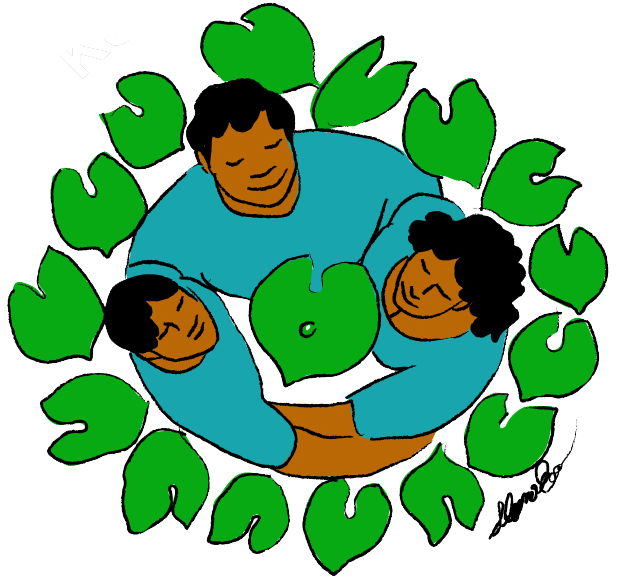The Health of Our Future
Back row (L-R): Dr. Alicia Turlington, River Kim, Tori Teramae, Front row (L-R): Casey Pantaleon, Janean Hargrave, Arlene Kiyohara. Photo courtesy of Dr. Alicia Turlington
The saying “it takes a village to raise a child” rings true here at KKV. As pediatricians, Dr. Alicia Turlington and Dr. Kriselle Gines focus on the growth and development of children in our community. But they say the care at KKV extends far beyond just the child. The whole family's health is considered, as there can be many factors affecting a child's health. This mindset exemplifies KKV’s philosophy of caring for the whole person so that they can be the best version of themself.
Dr. Turlington, who has been a pediatrician at KKV for 12 years, says a huge part of her job is working closely with other KKV departments. “At KKV, our population in pediatrics is a little more complicated than maybe at a private practice,” she says. “There are so many factors we see affecting the kids’ physical health that can be helped.” Many of those factors are socioeconomic. From housing to food insecurity to transportation, these factors can have a huge impact on a child’s health. At KKV, many of the resources for addressing these various needs can be found all under one roof. “What makes KKV so unique is that you can raise your hand and say you need help with something and so many people will show up for these kids and their families,” says Dr. Turlington. As a doctor, she feels like she’s always supposed to be the one in charge, but at KKV she says it’s so humbling to be a part of a team. Whether you’re a patient or provider, no one has to go through anything alone.
KKV’s pediatrics team is made up of providers, medical assistants and residents. They monitor the health of children from newborns to 18-year-olds based on each patients’ circumstance.
In July, KKV welcomed a new group of five pediatric residents who will be working with our community for the next three years. “I think residents get such a special experience working at KKV,” says Dr. Turlington. As their supervisor, she enjoys teaching them about the profession but also about our community. “They truly inspire me,” she says. “Having residents also keeps me learning and growing in my work.” Dr. Turlington started out as a pediatrics resident at KKV in 2008. She got hired full-time in 2012 and never looked back. Something that is so important to her is the longitudinal relationships she’s made over the years. Some patients she first met in 2008 are now teenagers and she is still close to them and their families. “KKV is all about creating connections. I can’t imagine working anywhere else.”
Although challenging at times, working with children can reap some of the biggest rewards. Dr. Gines shared one of her most memorable experiences while working at KKV:
“I met this patient when he was about eight months old. He was brought to me because he wasn’t growing as much as he should. His family had so many barriers to care, including no transportation, little to no access to healthy food, and literacy issues. He just wasn’t getting the nutrients he needed. So, our team connected the family with many other KKV departments, like WIC (Women, Infant, Children). They really helped his mom understand more about baby care and connected the family to specialists. Now, this patient is three years old and thriving. We were able to diagnose him with a rare condition, and thankfully our pharmacy can provide the medication he needs. He’s a happy, healthy kid. His mom is so grateful that he’s healthy. I’m so thankful to everyone who worked on his care. Every time I see him, he always has a smile on his face, and it reminds me this is why I do what I do.”
“Children are extremely important. Everything about them represents the future,” says Dr. Turlington. Something the pediatrics team is excited for in their future is a current grant they are working on to get culturally appropriate books for teens in our community. About two years ago, the team received a grant for culturally-appropriate books to give out to toddlers and elementary school age children. But now, there’s a need for materials like this for older kids. “Kids in our community have a unique cultural experience,” says Dr. Turlington. “With western-style education in the schools and traditional cultural expectations at home, plus socioeconomic factors, it can be really challenging for them.” Having these books to give out could help to improve the mental health toll many teens in Kalihi face. “We want something they can relate to, to show them they aren’t alone. The health of the kids is essential for the future of our community.”





